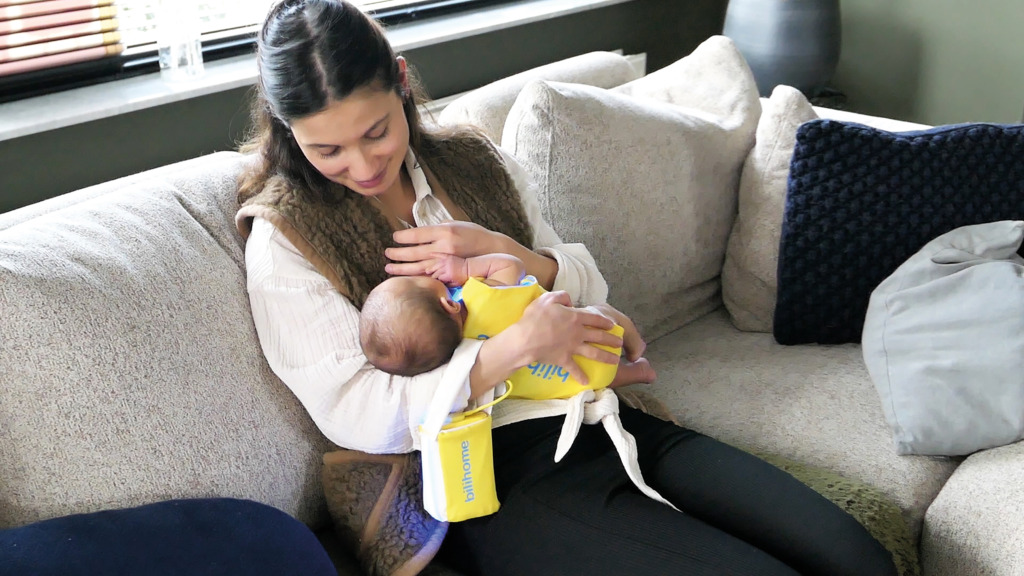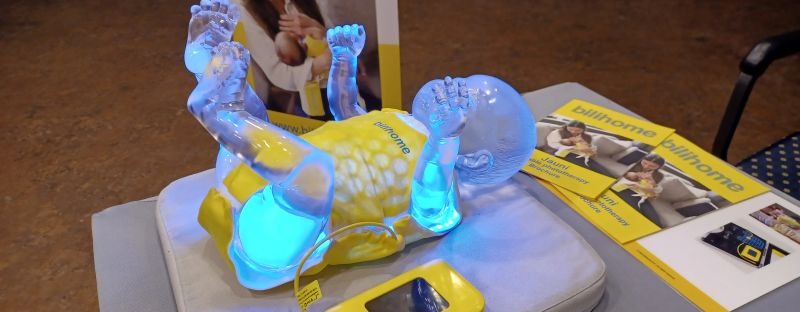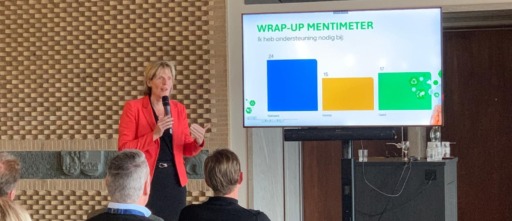Healing in your arms: how bilihome is transforming jaundice treatment
Bringing their newborn home is a moment of joy and relief for most parents. But for those whose babies develop neonatal jaundice it can quickly become a stressful period. Bilihome, a medtech startup, is changing that with wearable light therapy that allows infants to be safely treated at home, with their parents close by. “This isn’t just about innovation, it’s about human connection”, says CEO and co-founder Margret Huenerbein. “Holding your child shouldn’t be a privilege. It should be part of the treatment.”
Margret’s background is rooted in biomedical engineering and international business. After years of experience at companies like Dräger and Philips, she found herself questioning the impact of her work. “In a large corporation, the customer becomes the sales department — not the patient or clinician”, she says. “I wanted to reconnect with the people we were trying to help.”
Through the European health tech incubator NLC, Margret encountered bilihome, then as an early-stage idea by – Rick Wielens. The idea was born from Rick’s personal experience. After the birth of his twin sons, one needed treatment for jaundice in an incubator under blue light. Rick was shocked by how isolating and invasive the treatment was — his son was alone and cut off from human touch. It sparked a simple question: can’t this be done differently?
Being an expert in the field of neonatal care and having experiences with prematurity in her own family, Margret initially acted as an advisor. But the more she learned from local ‘kraamzorg’ organisations (maternity care at home) and her international network, with organisations like EFCNI (The European Foundation for the Care of Newborn Infants), Uppsala University and FIGO (International Federation of Gynecology and Obstetrics), the more she believed in the idea. In 2020, she stepped in as CEO and created bilihome’s concept. In 2021, she partnered up with a leading Dutch fashion tech designer and medtech partner to start the development journey. Four years later, Rick rejoined to work on the business operations, his expertise.
Wearable light therapy for newborns
At its core, bilihome offers wearable phototherapy: a soft, baby-sized romper embedded with medical-grade blue light to treat jaundice. This innovative garment allows newborns to receive phototherapy without being separated from their caregivers.
“Phototherapy breaks down bilirubin — a substance that builds up in babies after birth —and the standard method still involves placing infants in incubators under blue lights, undressed and blindfolded”, Margret explains. “We wanted to combine medical efficacy with emotional care.”
Alongside the wearable, bilihome has developed a corresponding mobile app for parents. The app supports self-remote monitoring and guidance, helping families track feeds, nappies, and empower parents with relevant information, related to jaundice management.. This integration empowers parents and simultaneously helps redirect the hospital staff to more critical patients or increasing administrative tasks: an impactful benefit given today’s widespread nurse shortage.
Importantly, bilihome’s innovation also transforms the clinical care path. Because jaundice symptoms often appear days after birth, many babies are already home when treatment becomes necessary. The wearable device makes home-based care possible — potentially preventing hospital (re)admissions, while promoting bonding and improving overall outcomes.

Clinical readiness and the road to market
Since 2020, bilihome has gone from a concept to a clinic-ready device. After completing rigorous development and testing phases, the startup now stands at the brink of CE certification, which is expected within the coming months.
Once certified, bilihome will begin commercial rollout in the Netherlands, Germany, and Sweden. “It’s an exciting, pivotal moment”, says Margret. “We’re now preparing for manufacturing, operations, sales, and implementation. Medical hardware isn’t like software; besides complex regulations as a medical device, it requires physical production and multiple suppliers. That’s why smart investor support is essential at this stage.”
Support from Briskr and beyond
Based in the Rijk van Nijmegen region, Bilihome has been supported by Briskr. Margret highlights Briskr’s role in providing valuable in-person workshops, such as valuation training and sales coaching.
“Briskr creates the right environment for startups at all levels”, she says. “Their sessions aren’t just theoretical — they’re practical, affordable, and a great way to meet other founders. This kind of support is incredibly meaningful for a hardware startup, where every euro counts.”
Scaling up with global impact in sight
In the coming years, bilihome plans to expand across Europe, with the UK in sight. The team also sees strong interest from hospital networks in the US, while looking further ahead to high-need regions in Asia and Africa — where jaundice prevalence is higher, but access to care remains limited.
“Globally, over 14 million babies need treatment for jaundice each year”, says Margret. “Only a fraction of them live in Europe and North America. The real impact lies beyond. That’s where we want to go.”
But first, the focus is on launching successfully in their home markets, achieving break-even within three years, and building strong partnerships with healthcare providers. “We’re not just selling a device”, Margret stresses. “We’re changing how care is delivered — and that takes collaboration.”
A brighter beginning for babies and their families
At its heart, bilihome represents more than a medtech innovation. It’s about rethinking newborn care from the perspective of the infant and the parent. By allowing treatment and bonding to go hand in hand, bilihome makes room for both health and humanity.
“We often say: let the light in”, Margret smiles. “But it’s not just about the light — it’s about the warmth of human touch. That’s what makes the difference.”




